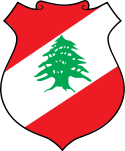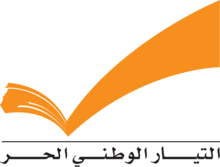- Free Patriotic Movement
-
Free Patriotic Movement
التيار الوطني الحرLeader Michel Aoun Founder Michel Aoun Founded Founded in 2003, officially declared in 2005 Headquarters  Rabieh — Beirut, Lebanon
Rabieh — Beirut, LebanonIdeology Conservatism
ReformismPolitical position Centre to Centre-right Religion Secular
(predominantly Christian)Parliament of Lebanon 19 / 128Cabinet of Lebanon 7 / 30Website http://www.tayyar.org] Politics of Lebanon
Political parties
ElectionsLebanon 
This article is part of the series:
Politics and government of
LebanonPresidencyGovernment- Prime Minister
- Cabinet
Legislature- Parliament
- Current members
- Lebanese Forces
- Movement of the Future
- Kataeb Party
- Hezbollah
- Free Patriotic Movement
- Syrian Social Nationalist Party
- Presidential 2008
- Parliamentary 2009
- Local 2010
Other issues- Governorates
- Districts
- Municipalities
- Armed Forces
- Human rights
- Foreign relations
The Free Patriotic Movement (FPM) (Arabic: التيار الوطني الحر, Al-Tayyar Al-Watani Al-Hur), also known as the "Aounist Movement" (Arabic: التيار العوني, Tayyar Al-Aouni), is a Lebanese political party, led by Michel Aoun, a former commander of the Lebanese army who served as a transitory Prime Minister of one of two governments that contended for power in the final years of the Lebanese Civil War (1988–1990). The movement was officially declared a political party on September 18, 2005
Though most of the party's support comes from Lebanon's Christian community, it also enjoys minor support from some Shia Muslims. The FPM party advocates secularism and the right to vote for Lebanese abroad. It is one of the allies of Hezbollah.
The Charter of the Free Patriotic Movement Party
The Free Patriotic Movement (FPM) is an extension of the Lebanese phenomenon that began with a long journey filled with struggle on which General Michel Aoun embarked. This journey continued throughout his office as head of the Lebanese Government in the late 1980s. The FPM phenomenon manifested itself in a heightened awareness among the Lebanese people of foreign conditions and their outcomes. With pioneering, humanistic and brave conduct, the FPM opposed the occupation of Lebanon domestically and internationally and presented many sacrifices while defending its freedom, sovereignty, independence, and the dignity of its people.
As a political party, the Free Patriotic Movement aims at renewing the political life in Lebanon on the bases of knowledge, ethics, progressiveness and the emancipation of the Lebanese individual. The Party is committed to work under the banner of change and reform according to the following tenets:
In Principles The FPM declares:
1. Its belief that the individual is intrinsically valuable and that people are born equal and die equal, having equal rights, freedom, and dignity, and being able to differ in opinions, orientations and beliefs. 2. Its commitment to the Universal Declaration of Human Rights and to all pertinent international charters and conventions, whose values and principles will act as guidelines to the Party’s goals and programs. 3. Its intransigence in the belief that Lebanon is a sovereign, free and independent entity founded on a social pact sanctioned by the free will of its people. 4. Its assertion that Lebanon is a distinctive human experience by virtue of its pluralism, intellectual interaction and openness to civilizations, and due to its pioneering democratic experience in the Arab world. 5. Its abidance by the Lebanese Constitution as a charter of governance in Lebanon, in its practice, interpretation, and ratification. 6. Its adherence to the openness of Lebanon to and its interaction with its Arab surroundings and the world, in such a way as not to conflict with the national belonging and provided that the Lebanese will be a dimension of Lebanon in foreign countries and not a foreign dimension within Lebanon. 7. Its conviction that men and women are equal in rights and obligations, since women are fundamental partners in the building of the society and in the making of the political decision.
In the Goals The FPM aspires to: 1. Guaranty the sovereignty of the Lebanese state and its independence and to safeguard its existence. 2. Build a nation of law based on equality, justice, social solidarity, equal opportunities and the upholding of a fair judicial system, since the latter is a true and impartial criterion for the consolidation of justice and democracy. 3. Establish democracy as a system of government and a way of life by guaranteeing the respect of freedoms and basic rights of the citizen. 4. Institute a culture of citizenship in the aim of achieving equality between the Lebanese; enact a discretionary civil personal status law; and separate politics from religion to facilitate the establishment of a secular state. 5. Protect the family because it is the nucleus in the building of a society and a nation. 6. Eliminate all legal and social distinctions between men and women and promote equality through practice on the basis of competence and aptitude. 7. Persevere in supporting the youth and promote their role in developing the society and in stimulating political life. 8. Enable the Lebanese Diaspora to exercise their political rights in Lebanon from their countries of expansion and strengthen the bond among them and between them and their motherland. 9. Disseminate a political culture that liberates the Lebanese from a mentality of tutelage and supplication and develop their sense of critique. 10. Adhere to the free economic system and personal initiative within the boundaries of human dignity and the welfare and principles of social justice. 11. Promote institutional functions on the basis of competence and the implementation of the principal of liability and accountability. 12. Protect and Preserve the environmental resources for a healthy environment is a natural and intrinsic human right and a part of human existence. 13. Make education available to all Lebanese, propagate Lebanese heritage, develop all sectors and encourage the mastering of skills, sciences and arts in such a way as to cater to the needs of the society and the requirements of the age. 14. Propagate the culture of peace, dialogue and democracy.
Aoun return from Exile
For many years, while Aoun was exiled in Paris, he led the FPM from abroad. He returned to Lebanon on May 7, 2005 after the Cedar Revolution forced the withdrawal of the Syrian forces, and then contested the legislative elections held in late May in early June although it placed him on the head of the largest Christian group of deputies.
Aoun also contested the Cedar Revolution which itself gave him the opportunity to come back to Lebanon.
2005 Elections and rise of the FPM
At the time of the 2005 elections, the FPM came up with a detailed political program which contained economic and political reform plans and gained the support of many Lebanese Christians.
The FPM won 21 seats in the parliament, and formed the second biggest bloc in the Lebanese Parliament.
Memorandum of Understanding between the FPM and Hezbollah
In 2006, the FPM signed a memorandum of understanding with Hezbollah organizing their relation and discussing Hezbollah's disarmament, given some conditions. The second and third conditions for disarmament were the return of Lebanese prisoners from Israeli jails and the elaboration of a defense strategy to protect Lebanon from the Israeli threat. The agreement also discussed the importance of having normal diplomatic relations with Syria and the request for information about the Lebanese political prisoners in Syria and the return of all political prisoners and diaspora in Israel.
2006 Lebanese Anti-Government Protest
Main article: 2006 Lebanese Anti-Government ProtestOn December 1, 2006, Free Patriotic Movement leader Michel Aoun declared to a crowd of protesters that the current government of Lebanon was unconstitutional, claiming that the government had "made corruption a daily affair" and called for the resignation on the government.[1] Hundred of thousands of supporters of this party, Amal Movement, and Hezbollah, according to the Internal Security Forces (ISF), gathered at Downtown Beirut trying to force Fouad Siniora to abdicate.
2008 Government formation
On July 11, 2008, FPM members, Issam Abu Jamra as Deputy-Prime Minister, Gebran Bassil as Minister of Telecommunications, and Mario Aoun as Minister of Social Affairs were elected into government. It is the Movement's first participation in any Lebanese Government.
2009 Elections
Main article: Lebanese general election, 2009Despite the strong media and political war against the Free Patriotic Movement, the results of the 2009 Elections granted the FPM 27 parliamentary seats. These results showed dis-improvement within the Christian votes, but despite this the FPM's bloc is the second largest in the Lebanese parliament. Based on statistics,FPM has lost about 25% of his popularity within the Christian vote in order to spread throughout the country at various ethnic groups of the Lebanese people . He know only represents around 53% of Christians. The FPM gained 7 more seats then the 2005 elections, earning at least triple the number of deputies of any other Christian-based bloc in the parliament due to geographical distribution. The total seats won were 57 out of 128, which led to a defeat for the FPM.
2009 Government formation
In November 2009, the Free Patriotic Movement nominated five ministers to join the first government headed by Saad Hariri. The five ministers included:
- Gebran Bassil as Minister of Power
- Charbel Nahas as Minister of Telecommunications
- Youssef Saade as Minister of State
- Abraham Dadayan as Minister of Industry
- Fadi Aboud as Minister of Tourism
OTV
Main article: OTV (Lebanon)The Free Patriotic Movement launched its own broadcasting channel (OTV) on the 20th of July 2007, and their own radio station called Sawt Al Mada (voice of scope in English) on June 1, 2009.
2011 Government formation
In June 2011, the Change and Reform bloc led by Aoun nominated eleven ministers to join the second government headed by Najib Mikati, gaining more than double the share they had in the former government The eleven ministers are:
Ministers with Portfolios:
- Shakib Kortbawi as Minister of Justice
- Fayez Ghosn as Minister of Defense
- Gebran Bassil as Minister of Energy
- Nicolas Sehnaoui as Minister of Telecommunications
- Vrej Sabounjian as Minister of Industry
- Fadi Aboud as Minister of Tourism
- Charbel Nahas as Minister of Labour
- Gaby Layoun as Minister of Culture
- Marwan Charbel as Minister of Interior and Municipalities (merge power between Aoun and Michel Suleiman)
Ministers without Portfolios:
- Salim Karam
- Panos Manjian
- Marwan Kheiredine
Notes
- ^ Huge Beirut rally demands change, BBC, 1 December 2006
External links
- Free Patriotic Movement - official website
- Free Patriotic Movement Message Boards (Official Forum)
- FLF in Germany: Freiheitlichen Libanesischen Freundeskreis e.V. German version of the FPM website.
- CPL en France : Rassemblement pour le Liban
- CPL en Belgique : Mouvement pour le Liban
- FPM political platform (in English)
- Memorandum of Joint Understanding between Hezbollah and the Free Patriotic Movement
- Charter of the Free Patriotic Movement Party
 Political blocs in Lebanon
Political blocs in LebanonGovernment (71) March 8 Alliance (33)Amal Movement (13) · Hezbollah (12) · Baath Arab Socialist Party (2) · Syrian Social Nationalist Party (2)Change and Reform bloc (25)Free Patriotic Movement (19) · Lebanese Democratic Party (4) · Marada Movement (3) · Armenian Revolutionary Federation (Tashnag) (2) · Solidarity Party (1) · Skaff BlocOthers (13)Progressive Socialist Party (11) · Glory Movement (Harakat Majd) (2) · Arab Democratic Party · Lebanese Communist Party · People's MovementOpposition (45) March 14 Alliance (45)Future Movement (26) · Lebanese Forces (8) · Kataeb Party (5) · Social Democrat Hunchakian Party (Hunchak Party) (2) · Armenian Democratic Liberal Party (Ramgavar Party) (1) · Democratic Left (1) · Islamic Group (1) · National Liberal Party (1) · Democratic Renewal Movement · Free Shia Movement · Independence Movement · Lebanese National Bloc · Tripoli BlocPortal:Politics · List of political parties · Politics of Lebanon Categories:- Political parties in Lebanon
- Political parties established in 2003
Wikimedia Foundation. 2010.

